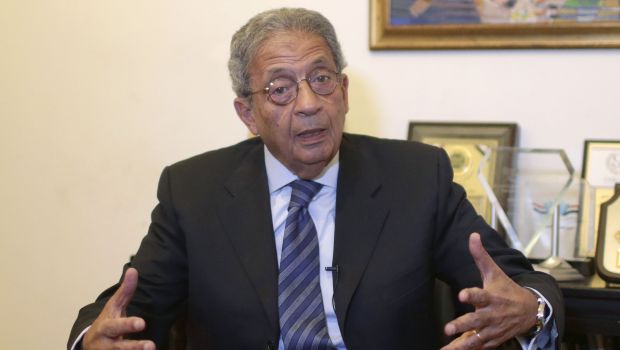
Former foreign minister and presidential candidate Amr Moussa speaks during an interview with Reuters in Cairo March 11, 2014. (REUTERS/Asmaa Waguih)
Moussa told Asharq Al-Awsat: “The decision by Field Marshal Sisi to run for president has now been finalized, and we agreed on the necessity to present the outlines of the program and its main ideas to the people.”
Moussa added that Sisi will announce his decision to run in the next few days, and will announce his political platform shortly afterwards.
Moussa, who ran unsuccessfully for president in 2012, did not specify an exact date but claimed that work was in full swing on drafting Sisi’s program.
Sisi, the head of the Egyptian armed forces and defense minister, won wide popularity among Egyptians when the army sided with mass protests to depose Muslim Brotherhood-backed president Mohamed Mursi in 2013.
Speculation has grown since Mursi’s ouster last July that Sisi intends to run for president.
Sisi, together with political and religious leaders, drew up a political roadmap in July 2013, which included amending the constitution and holding presidential and parliamentary elections. The transitional government has completed the first part at the start of this year, with the adoption of a new constitution.
Moussa served as head of the Committee of 50 which drafted the new constitution.
Moussa said: “Field Marshal Sisi’s program proposes moving on two axes: the first is to rebuild the state on modern foundations by implementing the articles of the 2014 constitution, which was passed by the Egyptian people in a public referendum; and the second axis relies on the inclusion of the people in the optimism for the future, which aims at achieving comprehensive development, and putting people in the picture transparently, regarding the economic situation of the country.”
Moussa claimed that Sisi’s program would focus on implementing the principles outlined in Egypt’s new constitution, including non-discrimination, respect for human rights, and achieving social justice, especially in light of projections of Egypt’s growing population.
Moussa further added that Sisi’s program included a plan to make fundamental changes to the borders of a number of governorates, in an attempt to jump-start economic development. He said this would involve change to the administrative map, and that the boundaries of governorates in Upper Egypt would be extended east and west.
Moussa said: “The main pillars of the program aim at eliminating poverty and achieving a rapid and tangible improvement in the quality of life of all Egyptians, bringing the middle class back to its natural size, restoring security, and reforming state institutions and ensuring efficiency and discipline in the performance of their role and in the fight against corruption.”
Elsewhere in Egypt, the office of Egypt’s interim president, Adly Mansour, rejected calls to reconsider a controversial article in Egypt’s new elections law exempting Egypt’s Higher Presidential Elections Committee (HPEC) from legal challenges.
HPEC is the body which will oversee the polls and their results.
Chancellor Ali Awad Saleh, a presidential constitutional adviser, said the presidency pointed out in its response that it could not accept the proposals because of the circumstances of the transitional period which the country was going through.
Saleh added that the presidency made its decision after taking advice from the General Assembly of the Constitutional Court, which said that immunizing HPEC’s decisions from appeals was constitutional.
However, a number of political parties announced their objection to the election law, and said the measure was illegal under the 2014 constitution. Prospective presidential candidate Hamdeen Sabahi said he rejected the move, but said it would not affect his decision about taking part.
Meanwhile, the Muslim Brotherhood has sent out signs of readiness to compromise in its attempts to overturn the toppling of Mursi and its exclusion from Egyptian politics, according to observers.
In a statement to the Turkish Anadolu Agency on Saturday, Gamal Hashmat, a leading figure from the Muslim Brotherhood, said: “The Brotherhood wants to reach a political consensus similar to the one which leader of the Tunisian Islamist Ennahda Party, Rached Ghannouchi, reached when he conceded authority.”
Tunisia’s then ruling Ennahda Party agreed to cede power to an interim technocratic government and allow fresh elections in January, after mounting public protests.
Hashmat added: “The Brotherhood is preparing to make an important political announcement in April,” and that the Brotherhood “intended to concede in order to unite the Egyptian people and restore democracy and freedoms.”
He further added that if the price of uniting Egyptians who supported legitimacy and democracy was for the Brotherhood and the Freedom and Justice Party to take a step or two backwards, and to take a back seat in the collective democracy, it was something acceptable which could be discussed.
But Magdy Qarqar, a leading figure in the Anti-Coup Alliance, an umbrella group of parties which has campaigned and protested against Mursi’s removal from office, dismissed Hashmat’s statement.
He told Asharq Al-Awsat that it was too early to talk about alliances with political forces who objected to the current political course, and that it was too early to expect the Brotherhood to build an alliance with revolutionary groups such as the April 6 Youth Movement or the Revolutionary Socialists.
Imam Youssef, a member of the Islamist Asalah Party’s higher committee, and a leading figure in the Anti-Coup Alliance, condemned Hashmat’s comments, calling on Brotherhood figures to be responsible regardig their public statements, and saying that the Anti-Coup Alliance had no initiatives to offer and that the Brotherhood’s decision applied only to its own organization, and not the alliance as a whole.
